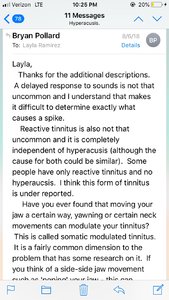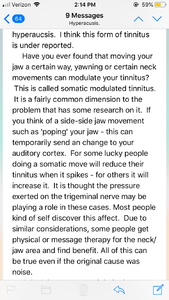- Apr 11, 2018
- 112
- Tinnitus Since
- May 2017
- Cause of Tinnitus
- Bars/nightclubs/MRI
Hey everyone! I thought I'd share this information since there seems to be A LOT of debate about this.
I have several consistent generic tinnitus tones, reactive tinnitus, and hyperacusis.
I've been doing a lot of research (reaching out to journalists and authors of research journals and such) and I came across this.
He is a hyperacusis researcher and he tells me reactive tinnitus is not the same thing as hyperacusis. So he says I need to seek out a tinnitus researcher/specialist.
I'm confused because everything I read on here points to it being hyperacusis.
In my case my reactive tinnitus is worse than my hyperacusis.
Thoughts?
All the best,
I hope everyone is doing okay.
I have several consistent generic tinnitus tones, reactive tinnitus, and hyperacusis.
I've been doing a lot of research (reaching out to journalists and authors of research journals and such) and I came across this.
He is a hyperacusis researcher and he tells me reactive tinnitus is not the same thing as hyperacusis. So he says I need to seek out a tinnitus researcher/specialist.
I'm confused because everything I read on here points to it being hyperacusis.
In my case my reactive tinnitus is worse than my hyperacusis.
Thoughts?
All the best,
I hope everyone is doing okay.


 Member
Member Could you maybe also upload the rest of the mail, i would like to read what he says about the somatic side of T.
Could you maybe also upload the rest of the mail, i would like to read what he says about the somatic side of T.